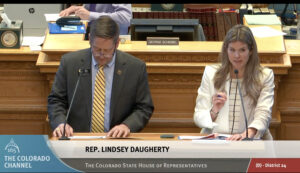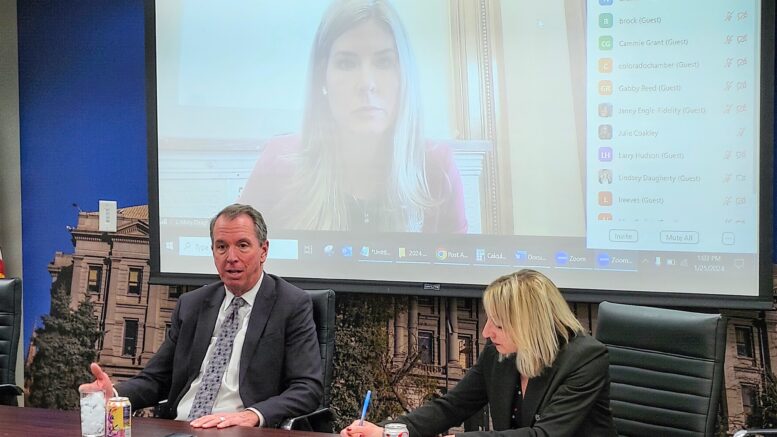In acknowledgement of the growing presence of technology in everyday life, the Legislature this year weighed into more areas affecting innovative Colorado companies than at any time in memory, extending state regulations into sectors that didn’t exist a decade ago.
Over the past week, Gov. Jared Polis signed the final handful of 2024 technology bills, including heavily negotiated measures that bring more transparency to transportation- and delivery-network companies from Uber to DoorDash. But the actions taken by legislators this year are expected to be just the first, rather than the last, state efforts to put guardrails around the social-media networks, apps and cutting-edge technologies that are bringing both ease and anxiety to Coloradans’ lives.
Legislators made initial incursions into fields ranging from artificial intelligence to neural-data collection and ventured further into the right to repair certain technologies and the regulation of broadband deployment. Business groups like the Colorado Chamber of Commerce and TechNet worked not to stop the proposed new regulations so much as to ensure that they were crafted narrowly enough to not dissuade cutting-edge companies from launching and growing here.
Balancing innovation and privacy rights
Senate Minority Leader Paul Lundeen, R-Monument, cosponsored two bills — one around biometric data and the other around children’s data — and said his motivation was to safeguard residents’ privacy, just as he did when pushing the Colorado Privacy Act in 2021. That historic piece of legislation established more ways that residents could examine, correct and control the digital storehouse of data on them, and many of this year’s pieces of legislation built upon it, so that data collections can be both beneficial and limited.
“When we use this data, it provides benefits to our lives — the health apps we have track our physical activity, our vitals — and it is particularly important that we protect this,” Lundeen told the Senate Judiciary Committee about one bill, House Bill 1130, in March. “If misused, it could foreclose an opportunity for you.”

Colorado state Reps. Mike Lynch and Lindsey Daugherty explain HB 1130, their bill on biometric identifiers to the Colorado House in February.
HB 1130, signed into law Friday, arguably was the biggest expansion of the Colorado Privacy Act among several bills this year, requiring companies gaining biometric identifiers like fingerprints or retinal scans to share that data with consumers and destroy it within 24 months.
Business and technology groups worried that it limited employers’ ability to collect and use workers’ data as a requirement to allow them access to more guarded buildings or computer files. But Lundeen and cosponsoring Sen. Chris Hansen, D-Denver, added an amendment late in the process that allows employers to collect and keep such data when it’s essential to workers’ job performance.
Legislators passed and killed technology bills
HB 1058, which was signed in mid-April, bans sales of neural data gathered from non-medical instruments that read consumers’ brain waves — a small but growing field of technology. And Senate Bill 41, signed Friday, enhances protections specifically for data that companies gather from minors.
Legislators took several different approaches to try to protect youth from what they viewed as the increasing harms of social-media sites. They succeeded when they sought to impose lighter rather than more stringent regulations.
HB 1136 requires social-media platforms to display popup warnings to minors who have been on certain websites for defined amounts of times and mandates that the state build a bank of resources on the mental and physical health impacts of social media on youth. In a signing statement Thursday, Polis said he appreciated the focus on youth mental health but expressed concerns that “heavy-handed” approaches like the mandatory popup displays could discourage innovation and prevent new businesses from locating in Colorado.

Colorado state Reps. Rose Pugliese and Judy Amabile discuss their House Bill 1136 in that chamber during the 2024 legislative session.
SB 158, meanwhile, sought to make social-media companies take bigger steps to implement age-verification procedures, default to protective settings for kids and report violations of illegal-activity content to law enforcement. With observers warning that some of the provisions in the bill would be unconstitutional, sponsors killed the measure late in the session, despite it having passed the Senate on a 30-1 vote.
AI regulation
Likely the most consequential bill of the session was SB 205, Senate Majority Leader Robert Rodriguez’s nationally precedent-setting law that will regulate development and deployment of artificial-intelligence systems. The bill seeks to stop “high-risk” systems from discriminating in decisions involving job applications, loan considerations or health care by requiring developers to provide information about machine-learning processes and deployers to tell customers when AI systems helped determine outcomes.
Even after Rodriguez removed provisions to apply the regulations to general-purpose AI like ChatGPT or synthetic AI that creates images, numerous technology leaders warned the bill still could cause entrepreneurs to launch or grow AI firms in other states with fewer rules. The Denver Democrat assured concerned onlookers, however, that a rulemaking process that would last through February 2026 would give ample opportunity for the Colorado Attorney General’s office to craft regulations that would be neither too harsh nor too loose.

Colorado Senate Majority Leader Robert Rodriguez speak about his AI bill.
Still, in an indication of the questions that continue to hang over SB 205, Polis penned a statement saying that he was signing the bill “with reservations” and imploring the federal government to weigh in to avoid a hodgepodge of state-by-state regulations. And with that he seemed to ensure that AI, the biggest tech topic of the 2024 session, is likely to wear that crown again in future years.
Polis also signed HB 1121, an expansion of the state’s right-to-repair law allowing owners of digital electronics from computers to washing machines to fix equipment themselves or take it to an independent repair shop. Like with previous laws to grant such rights to owners of wheelchairs and agricultural equipment, manufacturers expressed concerns about losing quality control, but advocates said the bill will expand choices for everyday buyers.
Broadband and app-based technology
Legislators declined by killing SB 91 to overturn new one-time and annual fees established by the Colorado Transportation Commission on broadband companies laying equipment in public rights of way as the state tries to expand coverage to 99% of the state. But they also declined to back a separate bill, HB 1245, that sought to require the state to pay prevailing wages to contractors installing such broadband with federal grants, as opponents worried about its impact on the cost and timing of getting infrastructure to remote areas.
Finally, with bill signings on Tuesday and Wednesday, Polis implemented first-in-the-nation requirements on companies such as Lyft, Uber and DoorDash that legislative supporters said are necessary to protect gig workers whose jobs often are governed by algorithms.

Colorado state Sens. Kevin Priola and Robert Rodriguez discuss their bill to regulate transportation network companies like Uber and Lyft.
SB 75 and HB 1129, whose final wording was negotiated with companies, require new transparency for both workers and customers regarding the portion of fares that are given to drivers, and they allow drivers to turn down jobs without negative repercussions. The bills also require the firms to inform drivers how to appeal deactivation decisions, though they stop short of requiring the state to hear appeals of drivers who feel their termination is unjustified, as a rejected bill from 2023 sought to do.
“Providing clear information about how much a company is making and how much a driver is taking home creates a better understanding of delivery processes for drivers and consumers alike,” said Sen. Kevin Priola, D-Henderson, who cosponsored both bills. “Both … ensure all app-based drivers receive the essential details about their work that they deserve.”
